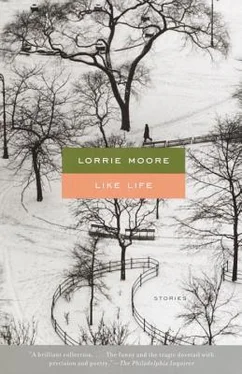“Yes,” said Millie. “He probably just wanted some fresh air. He’s been spending all his days in the city. He keeps going to the top of the Empire State Building, then just walks around looking at other tall buildings. And the cars. He hasn’t been to any plays or anything.”
There was a silence. Hane cleared his throat and said into the phone, “I suppose I’m not the best sort of person for him. He probably needs a man who is better with kids. Somebody athletic, maybe.”
“Tell us more about Italy, dear,” Millie broke in. She imagined Italy would be like Florida, all colors and light, but with a glorious ruin here and there, and large stone men with no clothes but with lovely pigeons on their heads. Perhaps there were plays.
“It’s great,” said Ariel. “It’s hard to describe.”
At twelve-fifteen they hung up. Hane, because he was reading the Scripture the next morning in church, went off to sleep. But Millie was restless and roamed the house, room after room, waiting for John to return. She thought about Ariel again, how much the girl’s approval had come to mean to her, and wondered how one’s children got so powerful that way. The week before Ariel left for England, the two of them had gone to a movie together. It was something they had not done since Ariel had been little, and so Millie had looked forward to it, like a kind of party. But during the opening credits Millie had started talking. She started to tell Ariel about someone she knew who used to be a garbage man but who was now making short industrial films for different companies. He had taken a correspondence course.
“Mom, you’re talking so loudly,” Ariel hissed at her in the dark of the movie theater. Ariel had pressed her index finger to her lips and said, “Shhhh!” as if Millie were a child. The movie had started, and Millie looked away, her face crumpling, her hand to her eyes so her daughter couldn’t see. She tried to concentrate on the movie, the sounds and voices of it, but it all seemed underwater and far away. When afterward, in a restaurant, Ariel wanted to discuss the film, the way she said she always did — an intellectual discussion like a college course — Millie had just nodded and shrugged. Occasionally she had tried to smile at her daughter, saying, “Oh, I agree with you there,” but the smile flickered and trembled and Ariel had looked at her, at a loss, as if her own mother were an idiot who had followed her to the movie theater, hoping only for a kind word or a dime.
Millie looked out the guest room window — John Spee’s room — into the night to see whether she might spy John, circling the house or kicking a stone along the street. The moon was full, a porthole of sun, and Millie half expected to glimpse John sitting on someone’s front step, not theirs, kneecaps pressed into the soft bulges of his eyes. How disappointing America must seem. To wander the streets of a city that was not yours, a city with its back turned, to be a boy from far away and step ashore here, one’s imagination suddenly so concrete and mistaken, how could that not break your heart? But perhaps, she thought, John had dreamed so long and hard of this place that he had hoped it right out of existence. Probably no place in the world could withstand such an assault of human wishing.
She turned away from the window and again opened the blue notebook on the desk.
More Crazy People I Have Seen in the States (than anywhere).
11. Woman with white worms on her legs. Flicking off worms.
12. Girl on library steps, the step is her home. Comb and mirror and toothbrush with something mashed in it laid out on step like a dressertop. No teeth. Screaming.
13. Stumbling man. Arms folded across his chest. Bumps into me hard. Bumps with hate in his eyes. I think, ‘This bloke hates me, why does he hate me?’ It smells. I run a little until I am away.
The front door creaked open, and shut with a thud. Millie closed the notebook and went out into the living room in just her nightgown. She wanted to say good night and make certain John locked the door.
He seemed surprised to see her. “Thought I’d just hit the hay,” he said. This was something he’d probably heard Ariel say once. It was something she liked to say.
“Ariel phoned while you were out,” said Millie. She folded her arms across her breasts to hide them, in case they showed through her thin gown.
“That so?” John’s face seemed to brighten and fall at the same time. He combed a hand through his hair, and strands dropped back across his part in a zigzag of orange. “She’s coming home soon, is she?” It occurred to Millie that John didn’t know Ariel well at all.
“No,” she said. “She’s traveling on the Continent. That’s how Ariel says it: on the Continent. But she asked about you and says hello.”
John looked away, hung up his coat in the front closet, on a hook next to his baseball cap, which he hadn’t worn since his first day. “Thought she might be coming home,” said John. He couldn’t look directly at Millie. Something was sinking in him like a stone.
“Can I make you some warm milk?” asked Millie. She looked in the direction John seemed to be looking: at the photographs of Ariel. There she was at her high school graduation, all formal innocence, lies snapped and pretty. It seemed now to Millie that Ariel was too attractive, that she was careless and hurt people.
“I’ll just go to bed, thanks,” said John.
“I put your clean clothes at the foot of it, folded,” said Millie.
“Thank you very much,” he said, and he brushed past her, then apologized. “So sorry,” he said, stepping away.
“Maybe we can all go into New York together next week,” she blurted. She aimed it at his spine, hoping to fetch him back. He stopped and turned. “We can go out to eat,” she continued. “And maybe take a tour of the UN.” She’d seen picture postcards of the flags out front, rippling like sheets, all that international laundry, though she’d never actually been.
“OK,” said John. He smiled. Then he turned back and walked down the hall, trading one room for another, moving through and past, leaving Millie standing there, the way when, having decided anything, once and for all, you leave somebody behind.
IN THE MORNING there was just a note and a gift. “Thank you for lodging me. I decided early to take the bus to California. Please do not think me rude. Yours kindly, John Spee.”
Millie let out a gasp of dismay. “Hane, the boy has gone!” Hane was dressing for church and came out to see. He was in a shirt and boxer shorts, and had been tying his tie. Now he stopped, as if some ghost that had once been cast from the house had just returned. The morning’s Scripture was going to be taken from the third chapter of John, and parts of it were bouncing around in his head, like nonsense or a chant. For God so loved the world … John Spee was gone. Hane placed his hands on Millie’s shoulders. What could he tell her? For God so loved the world? He didn’t really believe that God loved the world, at least not in the way most people thought. Love , in this case, he felt, was a way of speaking. A metaphor. Though for what, he didn’t exactly know.
“Oh, I hope he’ll be OK,” Millie said, and started to cry. She pulled her robe tight around her and placed one hand over her lips to hide their quivering. It was terrible to lose a boy. Girls could make their way all right, but boys went out into the world, limping with notions, and they never came back.
IT WAS A MONTH later when Millie and Hane heard from Ariel that John Spee had returned to England. He had taken the bus to Los Angeles, gotten out, walked around for a few hours, then had climbed back on and ridden six straight days back to Newark Airport. He had wanted to see San Francisco, but a man on the bus had told him not to go, that everyone was dying there. So John went to Los Angeles instead. For three hours. Can you believe it? wrote Ariel. She was back in Warwickshire, and John sometimes dropped by to see her when she was very, very busy.
Читать дальше












